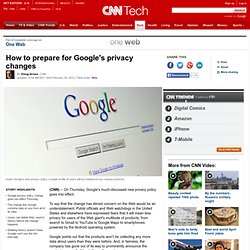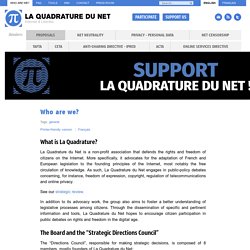

TOOLS. How to prepare for Google's privacy changes. Under Google's new privacy policy, a single profile of users will be created across various products.

Google privacy policy change goes into effect ThursdayThe change lets Google combine data on you from all of its sitesUsers can delete Web, search history before the change happensDeleting history doesn't mean Google can't use the info internally (CNN) -- On Thursday, Google's much-discussed new privacy policy goes into effect. To say that the change has stirred concern on the Web would be an understatement. Public officials and Web watchdogs in the United States and elsewhere have expressed fears that it will mean less privacy for users of the Web giant's multitude of products, from search to Gmail to YouTube to Google Maps to smartphones powered by the Android operating system. Google points out that the products won't be collecting any more data about users than they were before. Who are we ? What is La Quadrature?

La Quadrature du Net is a non-profit association that defends the rights and freedom of citizens on the Internet. More specifically, it advocates for the adaptation of French and European legislation to the founding principles of the Internet, most notably the free circulation of knowledge. As such, La Quadrature du Net engages in public-policy debates concerning, for instance, freedom of expression, copyright, regulation of telecommunications and online privacy. See our strategic review. In addition to its advocacy work, the group also aims to foster a better understanding of legislative processes among citizens.
The Board and the “Strategic Directions Council” The “Directions Council”, responsible for making strategic decisions, is composed of 8 members, mostly founders of La Quadrature du Net: Philippe Aigrain, ex-president of the association, computer scientist and writer. They are assisted by: Support For more information, see the Frequently Asked Questions. Why PrivacySOS.org? We, the Web Kids. PASTEBIN | #1 paste tool since 2002 create new paste trending pastes Pastebin is 300% more awesome when you are logged in. Sign Up, it's FREE! Public Pastes Logs25 sec agoSCIP CHAPTER STRAT...16 sec agoUntitled9 sec agoUntitled10 sec agoError Log report10 sec agoUntitled13 sec agoUntitledJavaScript | 15 sec agoUntitled18 sec ago We, the Web Kids By: czerski on Feb 15th, 2012 | syntax: None | size: 10.85 KB | hits: 57,189 | expires: Never download | raw | embed | report abuse | print Text below is selected.
Piotr CzerskiWe, the Web Kids. create a new version of this paste RAW Paste Data Piotr Czerski We, the Web Kids. White House announces new privacy "Bill of Rights," Do Not Track agreement. Saying "American consumers can't wait any longer" for better privacy rules, President Obama took the wraps off his administration's framework for new privacy regulations.

As part of its big reveal, the White House also announced the first product of that framework: the completion of an industry agreement on "Do Not Track" technology for behavior-based web advertising. The blueprint, outlined in an administration white paper, includes a "Consumer Privacy Bill of Rights"—a set of principles intended to guide how businesses handle consumers' personal information—and steps to incorporate those principles into federal regulations. The blueprint includes negotiating a set of practices with industry, consumer protection and privacy advocates, plus other "stakeholders" in privacy policy. The practices will then be enforceable by the Federal Trade Commission. The "Do Not Track" agreement is a first step toward that model.
TED 2012: New Browser Add-On Visualizes Who Is Tracking You Online. Photo: James Duncan Davidson/TED LONG BEACH, California — In the hour that Mozilla CEO Gary Kovacs lets his 9-year-old daughter surf the web every day, her wanderings have been tracked by dozens of sites.
To some degree, it’s to be expected. Tracking our online behavior is big business. The revenues involved in the top online tracking companies in the space is over $39 billion, Kovacs says. It’s not something that will be slowing any time soon. But that isn’t for a lack of trying. “Privacy is not an option,” Kovacs said in his presentation. Like some color-coded breakdown of alien DNA, Collusion composes a dot matrix diagram composed of grey dots — sites you’ve visited or are visiting — connected to red dots: sites that have passed your browser tracking cookies to monitor your site navigation.
“The memory of the internet is forever,” Kovacs said. You can download the browser add-on today at Mozilla’s web site.